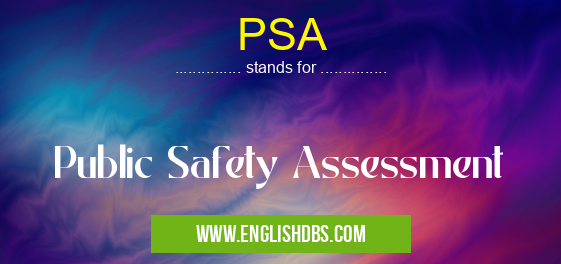What does PSA mean in POLICE
PSA (Public Safety Assessment) is a risk assessment tool used in the criminal justice system to evaluate the likelihood of an individual re-offending if released from custody. It is designed to provide objective and data-driven information to support decision-making regarding pretrial release, sentencing, and community supervision.

PSA meaning in Police in Governmental
PSA mostly used in an acronym Police in Category Governmental that means Public Safety Assessment
Shorthand: PSA,
Full Form: Public Safety Assessment
For more information of "Public Safety Assessment", see the section below.
» Governmental » Police
Elements of the PSA
The PSA considers various factors to assess an individual's risk of recidivism, including:
- Criminal history
- Age
- Education level
- Employment status
- Family and community ties
- Mental health and substance abuse history
Administration and Use
The PSA is typically administered by probation or parole officers during an assessment interview. The results are used to create a risk score that informs decisions regarding release or supervision conditions. Higher risk scores indicate a greater likelihood of re-offending, while lower scores suggest a lower risk.
Advantages of the PSA
- Objectivity: The PSA relies on data and statistical analysis, reducing the potential for bias or discrimination.
- Predictive validity: Research has shown that the PSA can effectively predict the likelihood of recidivism.
- Consistency: The PSA provides a standardized approach to risk assessment, ensuring consistency across jurisdictions.
Limitations of the PSA
- Potential for bias: While the PSA is designed to be objective, it may still contain some biases inherent in the data used.
- Overreliance: The PSA should be used as one component of a comprehensive assessment, not as the sole determinant of decision-making.
- Limited applicability: The PSA may not be suitable for all individuals, such as those with severe mental health issues or those who have been subjected to trauma.
Essential Questions and Answers on Public Safety Assessment in "GOVERNMENTAL»POLICE"
What is a Public Safety Assessment (PSA)?
A Public Safety Assessment (PSA) is a tool used to assess the risk of recidivism, or the likelihood that an individual will commit future crimes, among defendants charged with a crime. It is a standardized risk assessment instrument that considers various factors, such as criminal history, age, and education, to generate a risk score.
How is a PSA used in the criminal justice system?
PSAs can be used at various stages of the criminal justice process, including pretrial, sentencing, and parole hearings. They can help inform decisions about whether to release a defendant pretrial, the appropriate sentence, and the conditions of parole or probation.
Are PSAs accurate and fair?
The accuracy and fairness of PSAs have been debated. Some studies have shown that PSAs can be biased against certain groups, such as people of color and people with mental health conditions. However, PSAs are constantly being revised and updated to improve their accuracy and fairness.
What are the benefits of using PSAs?
PSAs can have several benefits, including:
- Enhancing risk assessment and providing a more individualized approach to criminal justice decisions.
- Reducing unwarranted disparities in sentencing and pretrial release outcomes.
- Promoting public safety by identifying high-risk individuals and providing appropriate supervision and support.
What are the concerns about using PSAs?
Concerns about PSAs include:
- Potential for bias, particularly against marginalized groups.
- Lack of transparency and accountability in the development and validation of PSAs.
- Overreliance on PSAs without considering other relevant factors in decision-making.
Final Words: The PSA is a valuable tool that provides objective information to support decision-making in the criminal justice system. By considering a range of factors, it helps to identify individuals who pose a greater risk of re-offending and allows for appropriate supervision and support measures to be implemented. However, it is important to use the PSA in conjunction with other assessments and to be mindful of its limitations.
PSA also stands for: |
|
| All stands for PSA |
